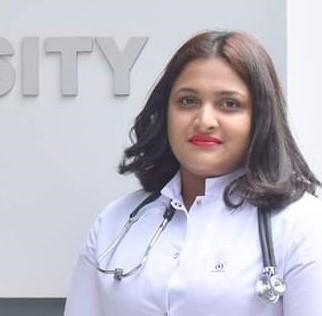Baby Shakes Head Up and Down When Sleeping
Usually, babies shake their heads as a part of interaction or while playing. Older infants often respond to questions or communicate by shaking their heads. Though the head-shaking in babies is normal, sometimes it could be a sign of neurological or developmental disorders.
Read this MomJunction post to know more about the normal and abnormal causes of head-shaking in infants and how to deal with it.
Normal Causes Of Baby Head-Shaking
If you notice your baby is happy and healthy, then head-shaking is nothing to worry about. Here are a few usual reasons why your baby may shake their head.
1. Developing motor skills
Once your baby's neck muscles are developed, they test their ability to hold up and move the head. It is a part of normal development. Usually, by the end of the first month, babies start moving head side to side. By the age of two months, they can raise their heads while on their tummy (1). It may be jerkier initially due to developing muscle control.
2. Self-soothing
Babies may shake head side to side as a part of self-soothing. It can be a natural tactic to calm themselves down to sleep. You may notice this behavior right before your little one falls asleep.
3. While breastfeeding
While breastfeeding, babies may shake their head to latch. It can be one of the first head movements babies may make. During nursing, they might also shake their head due to excitement. Though your baby may support and move their head side to side, you should support their head while feeding until the age of three months.
4. Playing and interaction
Babies start to move their heads as a part of social interaction in the initial months. . You may notice increased head shaking when your baby is excited.
5. Communication
A baby may use head-shake as a mode of non-verbal communication. As the baby grows older, they may shake their head along with making sounds to express emotions or demand something.
Baby Head-Shaking Causes That Are Not Normal
If head-shake is associated with other physical and behavioral symptoms, then it could be due to developmental problems or certain medical conditions. We will touch on a few:
6. Ear infection or fluid collection in the middle ear
It leads to pain or discomfort. This will often be associated with fever, crying, and other signs of illness. Ear tugging along with head-shaking may then occur (2).
7. Autism spectrum disorder
Babies with autism tend to shake their head involuntarily. Frequent headbanging is sometimes observed with this disorder. In such cases, check for these associated behavioral traits.
- Does not respond to sounds
- No reaction if you call their name
- No smile or eye contact
Early diagnosis of autism disorders may improve the quality of a child's life due to early interventions and less parental stress (3).
8. Myoclonic epilepsy
Myoclonic head jerks or spasm can be seen in babies during epilepsy. This may be due to serious neurological disorders (4).
9. Spasmus nutans
It is a disorder where babies do head-bobbing, with rapid eye movement called nystagmus. Sometimes, they may hold their neck in an abnormal position. This condition usually occurs between four months and one year of age and resolves later in life (5).
Repetitive Side-To-Side Head-Shaking When Sleeping
Shaking of head side-to-side during sleep can be a symptom of rhythmic movement disorder (RMD). It is a neurological disorder with repeated movement of large muscles before or during sleep, especially in infants. It usually involves head and neck movements and has the following associated symptoms (6).
- Headbanging
- Body-rocking
- Head-rolling
This condition might be genetic since it is often seen in families and among twins. Seek a doctor's opinion if you suspect RMD.
When To Consult A Doctor?
You may consult a pediatrician if you notice any of the following events, along with head shaking.
- Poor interaction with caregivers
- Abnormal eye movements
- Headbanging causing hair loss and injury
- Increased head-shaking during anxiety
- Trying to self-hurt
- Delay in development
- No response to sounds
- Head-shaking after two years of age
How To Stop Babies From Shaking Head?
Shaking head may cause dizziness and disorientation in babies, and it may result in falls. It might also increase the risk of hitting the crib, table, or wall. You may follow the following tactics to prevent your baby from head-shaking.
- If your baby does it before sleep, then try to find an alternative method to soothe them before they go to bed.
- If it is due to stress or agitation, then create a calm environment in their room.
- Giving a massage could help a baby to relax.
- If you sense that the baby shakes their head as a way to throw tantrums, then do not give in to their demands. As soon as attentin is given (iven negative attention) it enhances the behavior.
Shaking of the head by a baby is usually a normal developmental milestone. Excessive or too little movement might point towards underlying problems. However, if you are in doubt it is wise to rather consult with your pediatrician. It is also very helpful to take a video-clip of the movements that concerns you to show to your pediatrician.
When did your baby start to move their head? Let us know your experiences in the comment section below.
References:
MomJunction's articles are written after analyzing the research works of expert authors and institutions. Our references consist of resources established by authorities in their respective fields. You can learn more about the authenticity of the information we present in our editorial policy.
Recommended Articles:
-
- 10 Reasons For Baby Arching Back & Effective Ways To Correct It
- Flat Head Syndrome (Plagiocephaly): Causes, Symptoms And Treatment
- 11 Reasons Of Baby Sweating In Sleep And Tips To Manage
- Skin Tags On Babies – Everything You Need To Know
The following two tabs change content below.
- Reviewer
- Author

Dr. Elna Gibson is a general pediatrician. She did her MBChB and specialization as a pediatrician in South Africa at the University of Pretoria. She obtained MMed Pediatrics (masters) with distinction in 1993. As a young specialist, Dr. Gibson spent some time in the Netherlands, and then settled in the Vaal Triangle where she has practiced for 25 years. She... more

Dr. Bisny T. Joseph is a Georgian Board-certified physician. She has completed her professional graduate degree as a medical doctor from Tbilisi State Medical University, Georgia. She has 3+ years of experience in various sectors of medical affairs as a physician, medical reviewer, medical writer, health coach, and Q&A expert. Her interest in digital medical education and patient education made... more
Baby Shakes Head Up and Down When Sleeping
Source: https://www.momjunction.com/articles/baby-shaking-head-side-to-side-causes-prevention_00570105/
0 Response to "Baby Shakes Head Up and Down When Sleeping"
Post a Comment